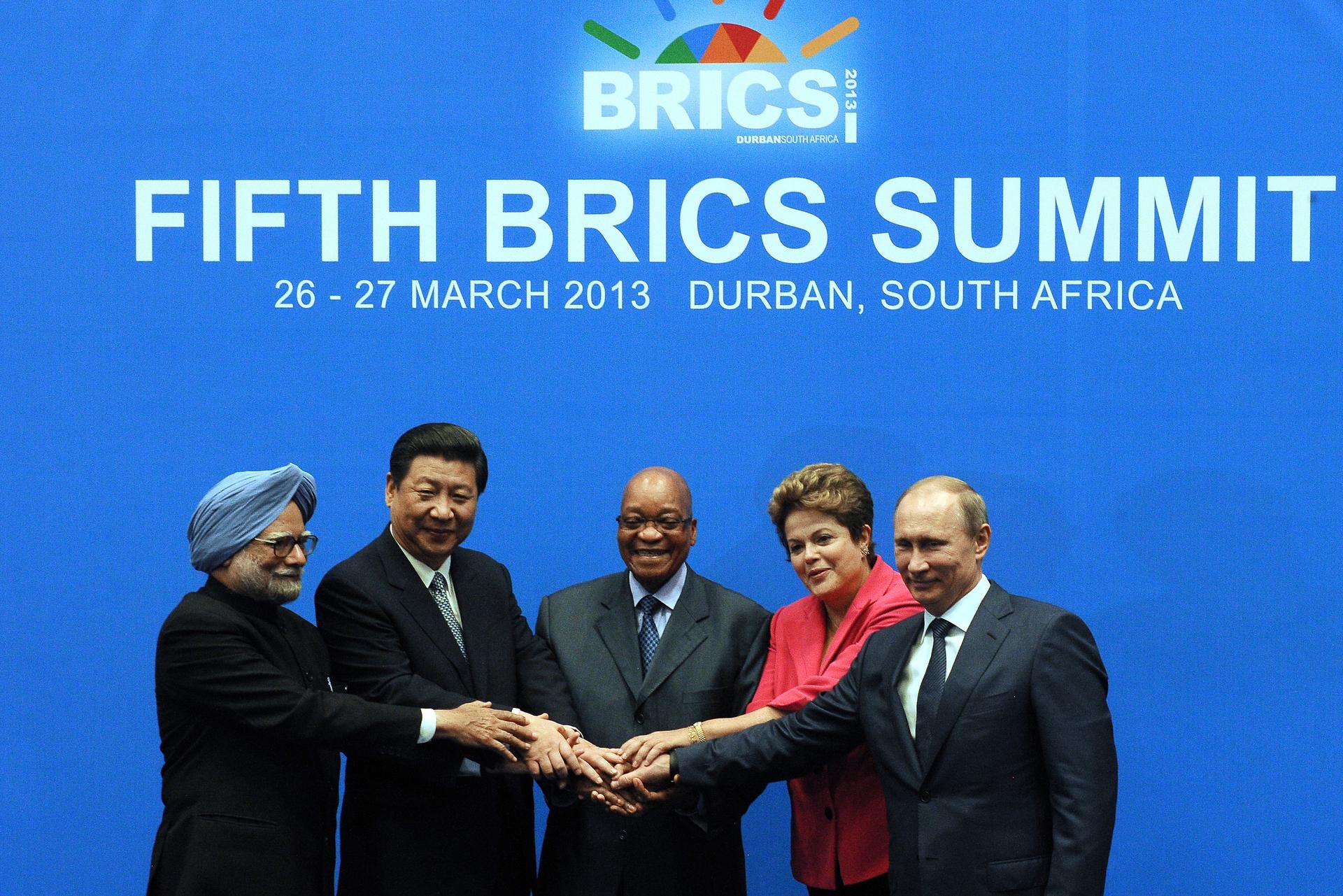Wading into Syria, BRICS take on political role
BRICS leaders, from left, India Prime Minister Manmohan Singh, China’s Xi Jinping, South Africa’s Jacob Zuma, Brazil’s Dilma Rousseff and Russian President Vladimir Putin, pose for a club photo in Durban on March 27.
DURBAN, South Africa — The BRICS group of emerging economies on Wednesday called for “full and unimpeded” access for humanitarian groups in Syria, a sign that what began as an economic bloc to rival Western powers may be embracing an increasingly political role.
During a day of talks in coastal Durban, the leaders of Brazil, Russia, India, China and South Africa focused in their public statements almost exclusively on economic issues, mainly plans for a BRICS development bank that could serve as an alternative to the World Bank and International Monetary Fund for the developing world.
But a final joint communiqué differed starkly in tone and content. The 13-page document addressed a range of geopolitical issues, from concerns about military threats against Iran, to support for efforts to stop drug trafficking in Afghanistan, to worrying about instability in the Democratic Republic of Congo.
On the subject of Syria, whose bloody civil war has continued into its third year, the leaders conveyed “deep concern with the deterioration of the security and humanitarian situation,” and “condemned the increasing violations of human rights and of international humanitarian law.”
The statement called for “immediate, safe, full and unimpeded access” for humanitarian aid in Syria, but refrained from siding with any particular party.
Russia's President Vladimir Putin, in Durban for the summit, has been one of the staunchest supporters of Syria's embattled President Bashar al-Assad — as well as his main supplier of weapons.
Moscow and Beijing have together blocked three United Nations Security Council resolutions intended to pressure Assad and impose sanctions on him in attempts to halt the escalating violence.
Earlier in the day, Assad urged the BRICS leaders to help "stop the violence" in his country, a day after the Arab League meeting in Doha decided to give his vacant seat in the grouping to the Syrian opposition.
In a letter to South African President Jacob Zuma published by Syrian state media, Assad said the suffering in his country is being caused by international sanctions. He had previously sent an emissary to South Africa with a message pleading for BRICS to find a “political solution” to the crisis.
"You, who seek to bring peace, security and justice to today's troubled world, focus all your efforts on ending the suffering of the Syrian people, which is caused by unjust economic sanctions that are against international law," Assad said in Wednesday’s letter.
More than 70,000 people have been killed during Syria’s civil war, while the United Nations estimates that 4 million people need humanitarian aid and millions more have been displaced. The UN children's agency, UNICEF, warned this month that a whole generation of Syrian children could be lost because of the continuing conflict.
At last year’s summit in New Delhi, the BRICS countries called for “an immediate end to all violence and violations of human rights” in Syria, but fell short of calling for specific action.
A coalition of civil society groups and former world leaders applauded the communiqué, but said that for it to be meaningful, BRICS states must press Assad’s government to allow the UN to cross the country’s border with Turkey, to assist people in opposition-held areas.
“The test of the BRICS’ resolve will be whether or not Assad grants immediate permission to the UN to cross Syria’s borders to meet the escalating needs,” a statement from the coalition said.
“The armed opposition must also allow safe passage to relief convoys and personnel into the territories within their control. Full, unimpeded access means aid anytime, anywhere.”
BRICS, which began as an acronym (minus the “S”) created by Jim O’Neill of Goldman Sachs in 2001 to describe a shift in the global markets, has taken on another life as the four countries were joined by South Africa and have tried to use the grouping for greater international clout.
An opinion piece by Salman Shaikh, director of the Brookings Institution’s Doha Center, called for the BRICS nations to support greater access for aid efforts in all areas of Syria, including cross-border operations.
“This is a strategic opportunity for the BRICS to use their influence and play a more decisive, helpful role,” Shaikh wrote.
The article you just read is free because dedicated readers and listeners like you chose to support our nonprofit newsroom. Our team works tirelessly to ensure you hear the latest in international, human-centered reporting every weekday. But our work would not be possible without you. We need your help.
Make a gift today to help us reach our $25,000 goal and keep The World going strong. Every gift will get us one step closer.
